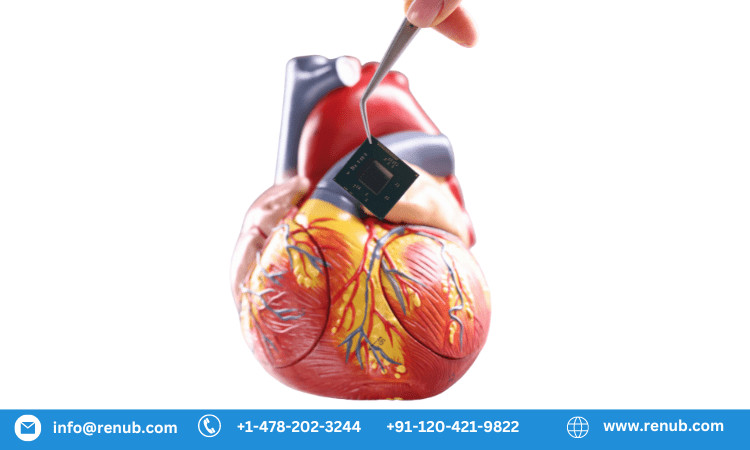The Rise of Cardiac Bio Implant Devices: A Market Poised for Growth
The market for Cardiac Bio Implant Devices is experiencing a surge in demand, propelled by a confluence of factors, including the aging global population, technological advancements, and the increasing prevalence of cardiovascular diseases. These devices, ranging from pacemakers and defibrillators to bio-prosthetic heart valves and ventricular assist devices (VADs), are revolutionizing the treatment of heart conditions and improving the quality of life for millions of patients worldwide.
Aging Population: A Major Driver
One of the most significant drivers behind the growth of the Cardiac Bio Implant Devices market is the increasing global population of older adults. Cardiovascular diseases, such as heart failure, arrhythmias, and valvular heart diseases, are more prevalent in individuals over the age of 65. The demand for pacemakers, defibrillators, and other cardiac implants is therefore rising as the number of elderly individuals increases. New innovations in the medical field and improved healthcare infrastructure are making it easier to deliver these life-saving devices to older populations, further boosting the market.
Technological Advancements: Shaping the Future
The Cardiac Bio Implant Devices market is rapidly evolving thanks to continuous advancements in medical technology. Innovations such as leadless pacemakers, MRI-compatible devices, and minimally invasive surgery are enhancing the safety, performance, and comfort of these implants. Portable devices with remote monitoring capabilities enable continuous patient monitoring and timely intervention, reducing hospitalizations and improving outcomes.
Advancements in Biomaterials and Tissue Engineering
Technological progress in biomaterials and tissue engineering has led to significant improvements in the strength and performance of bio-prosthetic heart valves, extending their lifespan and making them more viable options for patients. These technological advancements are a driving force behind the market's growth, providing better treatment options and expanding the use of cardiac bio-implants.
The Rising Incidence of Cardiovascular Diseases
The global rise in cardiovascular diseases is another key factor driving the Cardiac Bio Implant Devices market. Unhealthy dietary habits, lack of exercise, sedentary lifestyles, obesity, and stress are contributing to increased rates of heart disease worldwide. As the number of patients diagnosed with heart failure, arrhythmias, or coronary artery disease increases, the need for solutions, such as cardiac bio-implants, also grows.
Early Diagnosis and Awareness
Governments and healthcare organizations are actively promoting awareness campaigns and early diagnosis programs to increase the chances of identifying patients with cardiac diseases. This increased focus on early intervention contributes to the rising demand for implantable devices to manage these conditions.
Favourable Reimbursement Policies: Enabling Access to Care
Reimbursement policies and insurance coverage for cardiac bio-implant procedures play a crucial role in the growth of the market. Many developed countries have health insurance schemes and government healthcare programs that cover a significant portion of the costs associated with cardiac implants. This helps to alleviate the financial burden of treatment and makes high-quality cardiac care more accessible to a wider population.
Outcomes-Based Care and Pricing
The shift towards outcomes-based care, which focuses on the effectiveness and value of treatments, has influenced pricing in the cardiac bio-implant devices market. This approach encourages the use of high-quality cardiac implant devices, further contributing to market growth.
Asia Pacific: A Region with Growing Demand
The Asia Pacific cardiac bio-implant devices market is witnessing significant growth driven by factors such as the rising incidence of cardiovascular disease, a growing population, and increased healthcare spending. Governments in countries like China, India, and Japan are investing in healthcare infrastructure and promoting awareness of cardiac diseases, opening up the market for these devices.
Technological Advancement and Availability
Advancements in minimally invasive surgeries and improved bio-prosthetic heart valves, coupled with favorable government policies and the adoption of insurance products, are making these devices more accessible in the region. The increasing emphasis on early screening and prevention is also contributing to the sales of pacemakers, defibrillators, and other cardio devices in the Asia Pacific region.
Key Players and Market Dynamics
The Cardiac Bio Implant Devices market is a highly competitive landscape with a number of key players vying for market share. These companies are actively engaged in research and development, product innovation, and strategic partnerships to gain a competitive edge.
Some of the prominent players in the market include:
- F. Hoffmann-La Roche: A leading pharmaceutical and biotechnology company specializing in diagnostics and treatment of heart diseases.
- Eurofins Scientific: A global leader in bioanalytical testing services, providing comprehensive testing solutions for the medical device industry.
- Illumina: A leading provider of genomic sequencing technologies, offering solutions for genetic testing and disease diagnosis.
- Natera: A precision medicine company focused on non-invasive prenatal testing and other genetic testing services.
- Abbott: A diversified healthcare company with a strong presence in the cardiac devices market, offering a wide range of products including pacemakers, defibrillators, and heart valves.
- Thermo Fisher Scientific: A global leader in providing laboratory equipment and consumables, offering a wide range of products and services to the medical device industry.
- Quest Diagnostics: A leading provider of diagnostic testing services, offering a comprehensive range of cardiovascular tests.
These companies are continuously striving to innovate and introduce new technologies to meet the evolving needs of patients and healthcare providers. The market is expected to witness further consolidation and growth in the coming years as these companies expand their product portfolios and geographical reach.
The Future of Cardiac Bio Implant Devices
The future of the Cardiac Bio Implant Devices market looks promising. The continued aging of the global population, technological advancements, and rising awareness of cardiovascular diseases are all expected to drive further growth. As the industry continues to innovate, we can expect to see the development of even more advanced devices that offer improved safety, effectiveness, and patient comfort.
This evolving market is poised to transform the treatment of heart conditions, improving outcomes for patients and revolutionizing the future of cardiovascular healthcare.

















